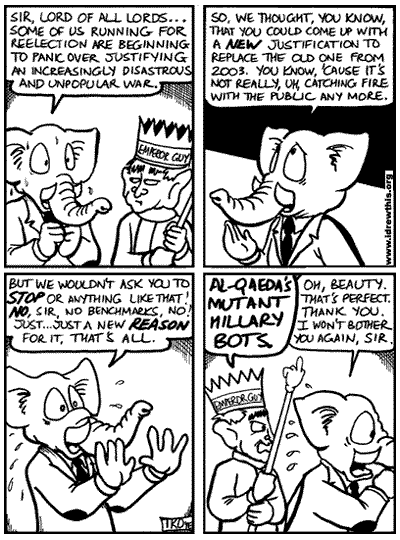Let's revisit, for a moment, the moronic sideshow that is the media's fascination with John Edwards paying $400, earlier this year, to have a barber come to his hotel and cut his hair between campaign stops on a swing through California.
There are a ton of reasons why this nugget of information probably did not merit being mentioned in the news once, let along being hyped for months by many of our best and brightest pundits into one of the biggest political stories of the campaign to date. It has no bearing at all on Edwards' ability to govern. It's Edwards's money and he can spend it how he wants. It's not as if Edwards regularly pays that for a haircut in any case, since he was paying extra to have the barber come to him during a hurried break in campaigning. Etc. etc. etc.
It's an idiotic story, and I can't believe any self-respecting journalist could defend it with a straight face.
I don't know if Marc Ambinder's face was straight when he typed
the following in The Atlantic Online, but type it he did. Apparently, to Mr. Ambinder, the Edwards haircut story is entirely valid, more so than the similar, more recent story about Mitt Romney spending roughly the same amount on makeup consulting, because:
There is a difference in the political reality: fairly or unfairly, a healthy chunk of the national political press corps doesn't like John Edwards.
Fairly or unfairly, there's also a difference in narrative timing: when the first quarter ended, the press was trying to bury Edwards. It's not so much interested in burying Romney right now -- many reporters think he's the Republican frontrunner.
Read that again. Let it sink in.
And then allow me to summarize the major points here. What Mr. Ambinder is saying is that if the press corps wants to kill a candidacy and decides to harp endlessly on a petty, insignificant story about the candidate's hair to do so, that by itself lends legitimacy to the story.
And, conversely, if the press decides a candidate is the "front runner," that makes it perfectly legitimate to cover him differently, and downplay embarrassing facts about him.
Is it just me or is that, I don't know,
the exact opposite of how journalism is supposed to function?Ambinder seems not to understand that what he's offering is not an explanation of the story's legitimacy, but an indictment of the way the press corps gauges stories' legitimacy.
I'm going to let Charlie Pierce speak for me, and
quote his response at length:
It is posts like this one that will one day make me give up and join the Carthusians. Leave aside the labored -- and laughably threadbare -- defense of why John Edwards's haircuts matter, but not before recalling that, when Jack Kennedy first ran for Congress, people chaffed him for living in Palm Beach and having had a butler at Harvard. Both items were true. Neither bit particularly deeply. Why? Because the political press of the time -- many of whom were fresh off a battlefield in the Ardennes or the Solomons -- realized when something was a punch line and something was a real issue, and with returning veterans sweltering with their families in Quonset huts along the Charles, who gave a rat's ass where JFK spent his winters? Anyway, this argument will be with us always, and it's every bit as dumb as it was in 1948.
However, where in hell do we go with that last passage there, about how the haircuts matter because "a healthy chunk of the political press corps" doesn't like Edwards, and how they're staying away from a sauce-for-the-goose position on Mitt Romney's makeovers because of their own private calculations of the relative electability of the two candidates. OK, here's the deal. Every member of that "healthy chunk" of the press corps should be fired. Today. This minute. Without pay or recompense. Let them all walk back inside the Beltway from Cedar Rapids if they have to. I value what I do. I value the work of the people in my business who do it correctly. But, holy mother of god, these people do not do what I do. It's OK to sneer at a candidate if you don't like him? It's OK to create a destructive narrative out of unmitigated piffle because he doesn't kiss your ass with the regularity you think you deserve, or because his press buses don't run on time, or because one of his staffers was late with the Danish in Keene? I watched a roomful of them boo Al Gore seven years ago, behavior that would have gotten them run out of any press box in the major leagues. Do you think one of these jamokes -- or jamokettes -- is thinking, "Maybe we should lay off the haircut thing because of what we all did to Gore in 2000, and look how well that worked out." Please.
Here's what I think -- the majority of people who cover national politics believe that history is whatever happened in the MSNBC Green Room 15 minutes earlier. I believe the campaign is covered by people with a completely unjustified sense of their own superiority, since not many of them understand or ever care about most of the issues, much less the horrendous bills that are going to come due upon whichever of these poor sods winds up with the job. I believe these people care more about their reputation around the bar at the Wayfarer in Manchester than they do about the interests of the people they purportedly serve. And, were I an editor, and someone brought me a story about John Edwards' hair or Mitt Romney's skin, that person would do it once. The second time, the lazy bastard would find himself typing bowling agate on Wednesday night.
Amen to that.
But it's worth noting that this has been the press's modus operandi for a long time, though. They're supposed to be the guardians of democracy, but often, when it comes to presidential elections at least, they believe they know better than we do, which, as far as I'm concerned, is the exact opposite of believing in democracy. And that's a very frightening state of affairs.
I've linked to this piece before, I think, and I'm going to quote it again (although really the
whole thing is worth reading--it will both inform and terrify you).
In it, Jonathan Schwartz, over at A Tiny Revolution, recalls a conversation with The
Washington Post's Richard Cohen, when he (Schwartz) was at Yale:
So anyway, here's a funny little story illustrating all this:
Washington Post columnist Richard Cohen came to talk at Yale in 1988, just after I arrived. Following schmancy Yale tradition, he had tea with a small group of students and then ate dinner with an even smaller group. I weaseled my way into attending.
Gary Hart had recently flamed out in the '88 presidential race because of Donna Rice. And at dinner Cohen told all us fresh-faced, ambitious, grotty youths this:
The Washington press corps had specifically tried to push Hart out of the race. It wasn't because Hart had had extramarital affairs—everyone knew this was the norm rather than the exception among politicians. So Hart wasn't at all unusual in this respect. Instead, Cohen said, it was because the press corps felt that Hart was "weird" and "flaky" and shouldn't be president. And when the Donna Rice stuff happened, they saw their opening and went after him.
(I wish I remembered more about what Cohen said about the specific gripe of the press corps with Hart, but I don't think he revealed many details.)
At the time, I remember thinking this:
1. How interesting that the DC press corps knows grimy details about lots of politicians but only chooses to tell the great unwashed when they decide it's appropriate.
2. How interesting that the DC press corps feels it's their place to make decisions for the rest of America; ie, rather than laying out the evidence that Hart was weird, flaky, etc., and letting Americans decide whether they cared, they decided run-of-the-mill citizens couldn't be trusted to make the correct evaluation.
3. How interesting that Cohen felt it was appropriate to tell all this to a small group of fresh-faced, ambitious, grotty Yale youths, but not to the outside world. And how interesting that we were being socialized into thinking this was normal.
It's the same thing all over again with John Edwards. It's not that the media, for the most part, actually think it's important. It's that they think Edwards shouldn't be president and should be forced out of the race. And, they don't trust that the masses would understand or agree with their reasons for thinking this, so, when they got handed a story about Edwards, on a single occasion, paying too much for a haircut, they were like "Hey, you know, we could spin this into some huge story about how he's a hypocrite for caring about poor people despite no longer being poor himself!"
Because they think us unwashed non-Beltway types will fall for that, and that they know better.
The irony of this "father knows best" behavior on the part of the national press is that, in fact, they aren't behaving like wise parents or even adults. They resemble nothing so much as a clique of high school Cool Kids, radiating a completely unearned sense of superiority, and of their own inherent right to pass judgment and then have that judgment be the final word, and convinced that their own petty gripes and grudges and power struggles and catty taunts have actual substance to them, actually matter.
But this isn't high school. It's a country. The most powerful in the world, and with the quality of life of 300 million people hanging in the balance. And, given that, you'd think they would learn.
Because they decided Al Gore shouldn't be president, eight years ago. And so they made up lies about him, like "he said he invented the internet," to prove what a lying dope he was. And they made fun of how he dressed, made fun of how he talked, mocked him for daring to actually understand and discuss policy. Bush was just, like, way more fun! I wanna drink beer with that guy! Elect him! (Did I mention this reminds me of high school?)
And it was a disaster. The guy they picked ended up being the worst and most destructive president in the nation's history. You might think they'd change their ways, given that, and stop playing at being kingmakers, and just tell us what we need to know to make an informed decision.
But they won't, of course. They'll try to drive people they don't like out of the race by talking about their hair, and I imagine their judgment about who should be president is probably as deeply awful as it was when they decided that smug frat boy George W. Bush would do great at the job.
And that scares me a lot.









